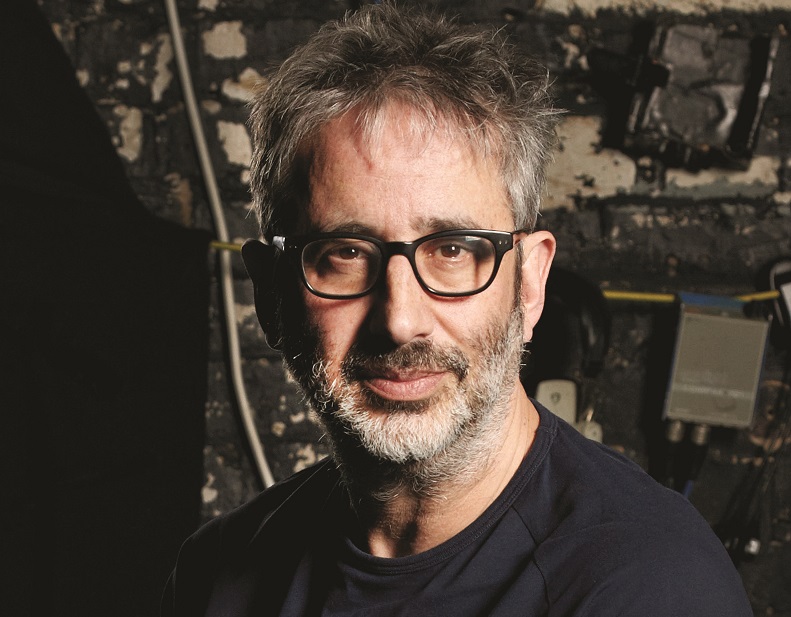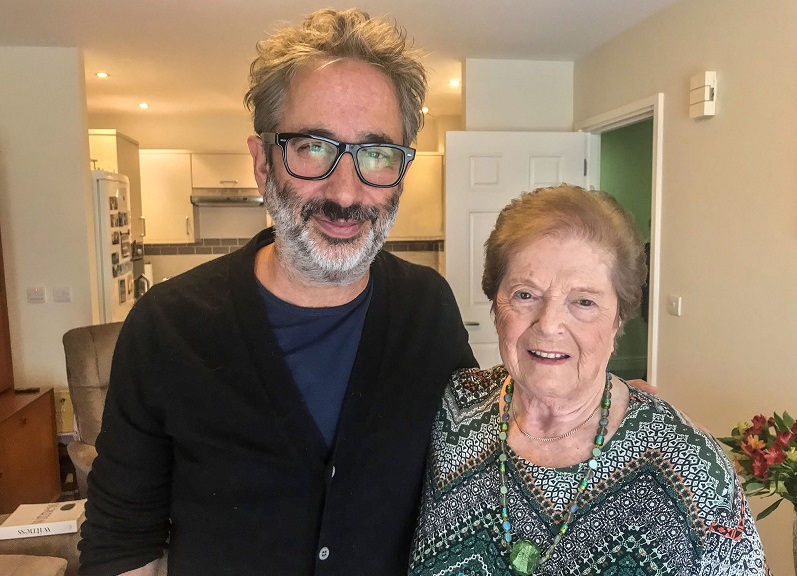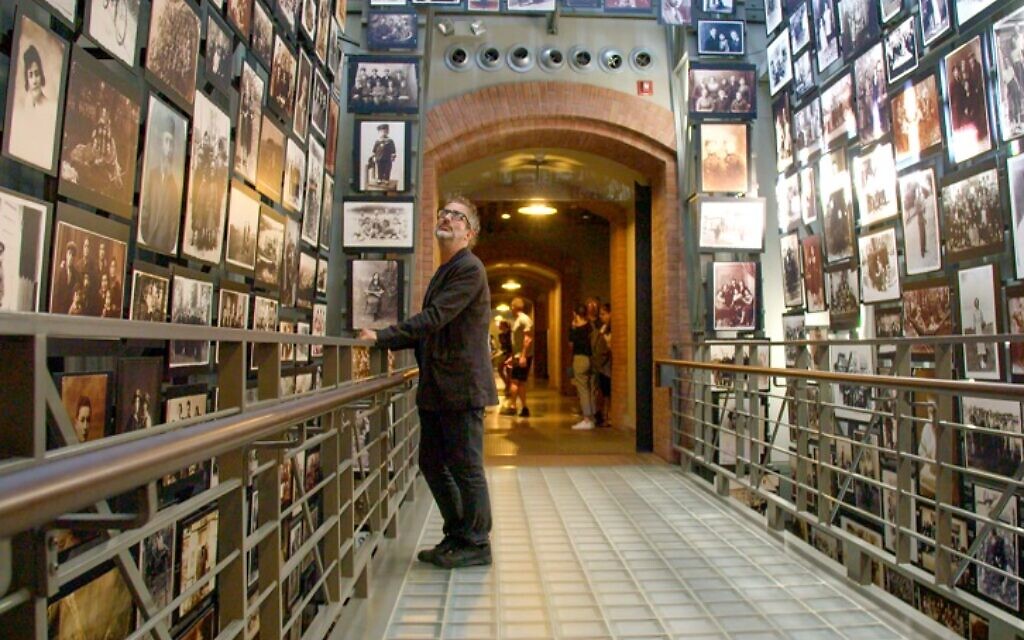David Baddiel on Holocaust denial: ‘The truth has never been more fragile’
The comedian and presenter delves into the very roots of revised history in his thought-provoking BBC2 documentary, Confronting Holocaust Denial with David Baddiel
When David Baddiel meets someone who doesn’t believe the Holocaust happened, it doesn’t just sadden him – it puts him into a rage.
“I feel a little out of control about how I’m going to react,” confesses the author and televison presenter, before telling me he had to hold himself back from punching a man who believed there were swimming pools rather than gas chambers at Auschwitz.
For within Baddiel’s view of the world, there is no greater untruth than Holocaust denial, something he expresses as “the archetypal lie in our culture, from whereby all the other lies fan out” – and, given his family history, it’s easy to understand why.
Get The Jewish News Daily Edition by email and never miss our top stories Free Sign Up
His late mother, Sarah, was aged just five months when she and her parents escaped from Nazi Germany and came over to England in 1939.
By his own reckoning, Baddiel is “only here by the skin of my teeth”.
To have to defend the facts of the Holocaust, or indeed that it happened, seems absurd to him. After all, he “grew up with the certainty that the Holocaust happened and that it was something we always have to remember and take seriously”.
Yet a recent poll shows that one in six people don’t know about the Holocaust or don’t think it happened as the history books say.
Watch a clip here:
That sobering statistic, coupled with the loss of first-hand witnesses to the atrocities of the Second World War and the rise of a time in which “untruths have a lot of power”, compelled Baddiel to find out more about the reasons why people deny the Holocaust, which he declares is just another form of antisemitism.
The result is his thought-provoking documentary, Confronting Holocaust Denial, which airs on Monday on BBC Two, and delves into the very roots of revised history, from Nazi attempts to cover up their activities and the British government glossing over the more unsavoury aspects of Hitler’s regime, to pseudo-science being used to “prove” the murder of six million Jews was a falsehood.
He also attempts to take Facebook to task over banning hate speech, but finds several pages where Holocaust deniers are posting such material on the social media platform.
Yet to really get to the nub of his subject, Baddiel decides to meet a Holocaust denier in person.
This was despite experiencing much angst over doing so and against the advice of academic Deborah Lipstadt – whom Baddiel says he “intensely admires” – and Anthony Julius, the British lawyer who successfully defended her after she was sued for libel by Holocaust denier David Irving.

“Deborah has a position that debating the facts of the Holocaust is to denigrate the memory of the victims and the memory of the Holocaust,” explains Baddiel. “But how, then, do you take on denial?
“On the internet, there’s this feeling not to feed the trolls. Now I don’t agree with that to some extent, because I think the trouble is our culture is being shaped by them and Holocaust deniers are the extremists of the trolls. Ignoring them has not worked. My personal feeling is you have to try to take them on.”
Despite feeling “incredibly discomforted”, Baddiel arranges to travel to Ireland and meet staunch denier Dermot Mulqueen, who was arrested in 2015 after smashing an axe into a television set as part of a “conceptual art performance” to launch International Holocaust Hoax Day.
He also runs an alternative tour of Auschwitz and likes to play the guitar while singing offensive songs about Jews.
But with a 7,000-strong following on Facebook, Baddiel knows Dermot is someone to be feared rather than mocked.
When they meet, Baddiel is clearly uneasy and reluctantly shakes his hand, before spending a deeply uncomfortable three hours trying to unravel Dermot’s conflicting view of the world.
I ask Baddiel if he felt he was any clearer after their meeting.
“It’s very difficult to talk to a person and come away feeling that you’ve completely understood why they do what they do,” he confesses. “But I did get a sense that he is a man trapped in his own ideological conundrum, which allows him to make sense of whatever rage and anger he feels about the world.

“That’s what’s going on with a lot of those Holocaust deniers. They are normally men who feel aggrieved or let down by the world, but are special because they’ve not had the wool pulled over their eyes like everyone else. It’s a weird way of comforting themselves with their superiority of secret knowledge.”
As disquieting as Baddiel’s meeting with Mulqueen is, it’s his next interview that packs the most powerful punch, as survivor Rachel Levy opens up about the atrocities she witnessed first-hand during the Shoah.
“There’s a growth of a movement that would say these testimonies are not true, so it was important just to feel the truth of it,” concludes Baddiel.
“Having Rachel’s testimony in a documentary where you talk about questioning that truth makes it all the more powerful – especially in a world where the truth is much more fragile than it’s ever been.”
- Confronting Holocaust Denial with David Baddiel aired on Monday, 17 February, 9pm, on BBC Two.
- Watch it on BBC iPlayer here: https://www.bbc.co.uk/iplayer/episode/m000fjqk/confronting-holocaust-denial-with-david-baddiel

Thank you for helping to make Jewish News the leading source of news and opinion for the UK Jewish community. Today we're asking for your invaluable help to continue putting our community first in everything we do.
For as little as £5 a month you can help sustain the vital work we do in celebrating and standing up for Jewish life in Britain.
Jewish News holds our community together and keeps us connected. Like a synagogue, it’s where people turn to feel part of something bigger. It also proudly shows the rest of Britain the vibrancy and rich culture of modern Jewish life.
You can make a quick and easy one-off or monthly contribution of £5, £10, £20 or any other sum you’re comfortable with.
100% of your donation will help us continue celebrating our community, in all its dynamic diversity...
Engaging
Being a community platform means so much more than producing a newspaper and website. One of our proudest roles is media partnering with our invaluable charities to amplify the outstanding work they do to help us all.
Celebrating
There’s no shortage of oys in the world but Jewish News takes every opportunity to celebrate the joys too, through projects like Night of Heroes, 40 Under 40 and other compelling countdowns that make the community kvell with pride.
Pioneering
In the first collaboration between media outlets from different faiths, Jewish News worked with British Muslim TV and Church Times to produce a list of young activists leading the way on interfaith understanding.
Campaigning
Royal Mail issued a stamp honouring Holocaust hero Sir Nicholas Winton after a Jewish News campaign attracted more than 100,000 backers. Jewish Newsalso produces special editions of the paper highlighting pressing issues including mental health and Holocaust remembrance.
Easy access
In an age when news is readily accessible, Jewish News provides high-quality content free online and offline, removing any financial barriers to connecting people.
Voice of our community to wider society
The Jewish News team regularly appears on TV, radio and on the pages of the national press to comment on stories about the Jewish community. Easy access to the paper on the streets of London also means Jewish News provides an invaluable window into the community for the country at large.
We hope you agree all this is worth preserving.
-
By Brigit Grant
-
By Laurent Vaughan - Senior Associate (Bishop & Sewell Solicitors)
-
By Laurent Vaughan - Senior Associate (Bishop & Sewell Solicitors)
-
By Laurent Vaughan - Senior Associate (Bishop & Sewell Solicitors)
-
By Laurent Vaughan - Senior Associate (Bishop & Sewell Solicitors)






















